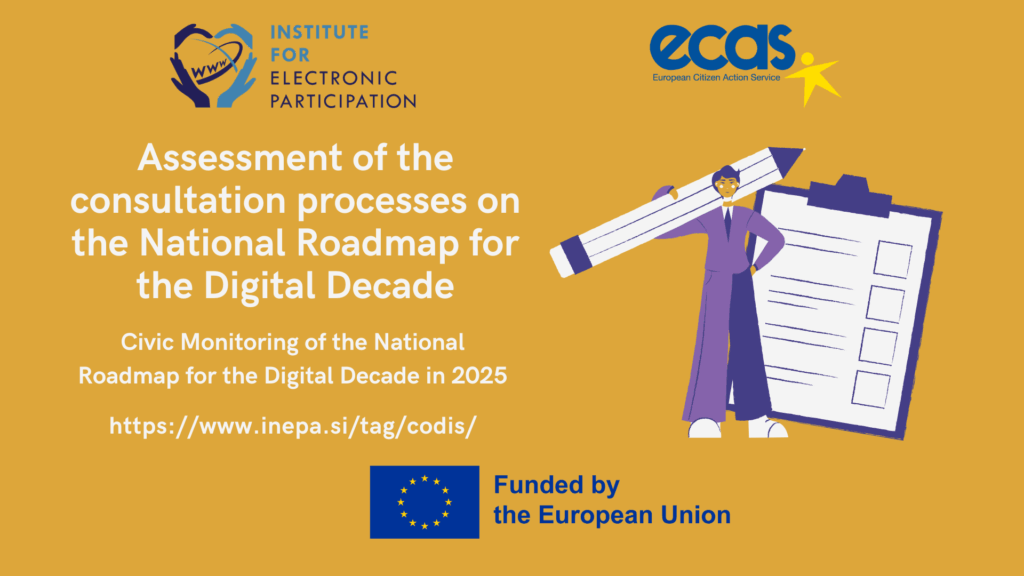The Slovenian government conducted a consultation during the drafting of the National Strategic Roadmap for the Digital Decade in September 2023 and its update in December/January 2025. Both consultation processes were fairly transparent and partially open, but not inclusive.
According to the “Guidelines to the Member States on the preparation of the national Digital Decade strategic roadmaps” (2023/C 230/04) and Article 9 of Decision (EU) 2022/2481 of the European Parliament and of the Council, Member States are expected to consult with private and public stakeholders when preparing their national roadmaps.
The Slovenian government conducted a consultation during the drafting of the National Strategic Roadmap for the Digital Decade in September 2023 and its update in December/January 2025 as part of adopting Action Plan for the Digital Slovenia 2030 Strategy for 2025-26.
Assessment summary
Both consultation processes were fairly transparent and partially open, but not inclusive. When preparing national measures, only a very small number of stakeholder proposals were considered and consequently incorporated into the National Roadmap.
The Ministry enabled a 14-day public consultation period on the National Roadmap and a 30-day public consultation period on its update. Consultations took place exclusively online via an official email address provided by the Ministry of Digital Transformation for stakeholders to submit their contributions. During the drafting of the National Roadmap, the Ministry organised an online public hearing on the draft document.
Only a limited number of organised stakeholders (18) participated in the public consultation on the drafting of the National Roadmap. There was some degree of representativeness relating to the four umbrella organisations from commerce, industry and local communities, as well as NGOs and professionals. During the public consultations, no particular efforts were made to engage with vulnerable, marginalised or underrepresented groups. Considering the number of stakeholders involved, the diversity of stakeholders was limited to the NGO sector only.
The Ministry of Digital Transformation response to the public consultations indicates, that few stakeholder proposals were incorporated into the National Roadmap. Of the 82 comments submitted during the drafting of the national plan, only two were considered relevant. Following intervention by non-governmental organisations with the European Commission, an additional seven proposals from civil society were included in the subsequent revision of the Roadmap. During the consultation on updating the Roadmap, 22 out of 162 comments were included, most of which were additions to descriptions or questions about measures provided by stakeholders. Proposals submitted by stakeholders during the update process did not significantly affect the content of the National Roadmap.
The public consultation report was prepared for the drafting of the national plan and submitted to the European Commission, but not for its update. Six months after the consultation on the update to the National Roadmap ended, the joint response of the ministries to the stakeholders’ comments on the update to the national plan was published on the website. However, the stakeholders who participated in the consultation were not informed of this directly.
The National Roadmap does not include any particular systemic mechanisms for continuous public feedback and involvement during implementation and updates. The ministry responsible for digital transformation will oversee its implementation and updates within the Interministerial working group for digital transformation projects. Although the Government Council for Digital Transformation will be kept informed, it will probably not have the opportunity to influence implementation and updates in practice.
Recommendations on openness and inclusiveness of public participation
The following recommendations for the Ministry of Digital Transformation have been formulated to encourage public participation in updating the National Strategic Roadmap for the Digital Decade in future. These recommendations are based on an evaluation of the current consultation processes in terms of their openness, inclusivity and transparency.
- Allow sufficient time for public participation (a minimum of 30 days).
- Present a holistic timeline of the public participation process, including the main milestones.
- Provide opportunities for public participation via multiple channels, both online and offline.
- Deploy various participation methods, such as deliberative workshops, surveys ect.
- Encourage the participation of diverse stakeholders and underrepresented groups.
- Incorporate public input to the greatest extent possible.
- Provide solid, well-funded and trustworthy reasoning for not incorporating public input.
- Communicate feedback directly to stakeholders.
- Prepare a comprehensive report on public participation.
- Publish the results of consultations, stakeholder contributions and final decisions in one place.
- Ensure continuous public feedback and involvement during implementation and updates.
- Give preference to dialogic democracy and deliberation (co-creation) over consultation (information exchange) and discussion (argumentative debate).
Full assessment of the consultation processes involved in preparing and updating the National Roadmap for the Digital Decade in Slovenia
Disclaimer
Project “Co-creating Digital Policies in Slovenia Phase III” receives funding by European Citizen Action Service (ECAS) in the framework of the EURECA 2025 project, which is co-funded by the European Union. Views and opinions expressed are however those of the author(s) only and do not necessarily reflect those of the European Union or ECAS. Neither the European Union nor ECAS can be held responsible for them.

